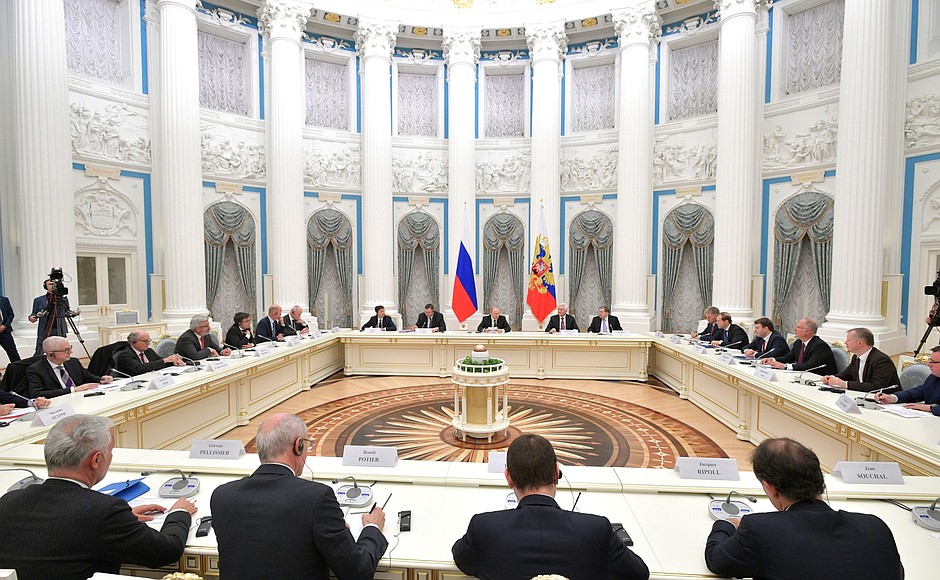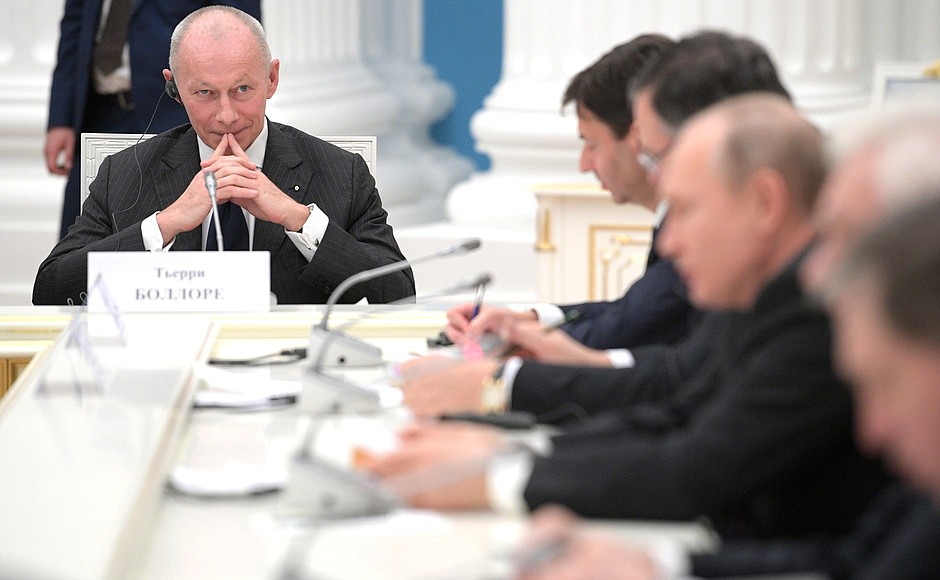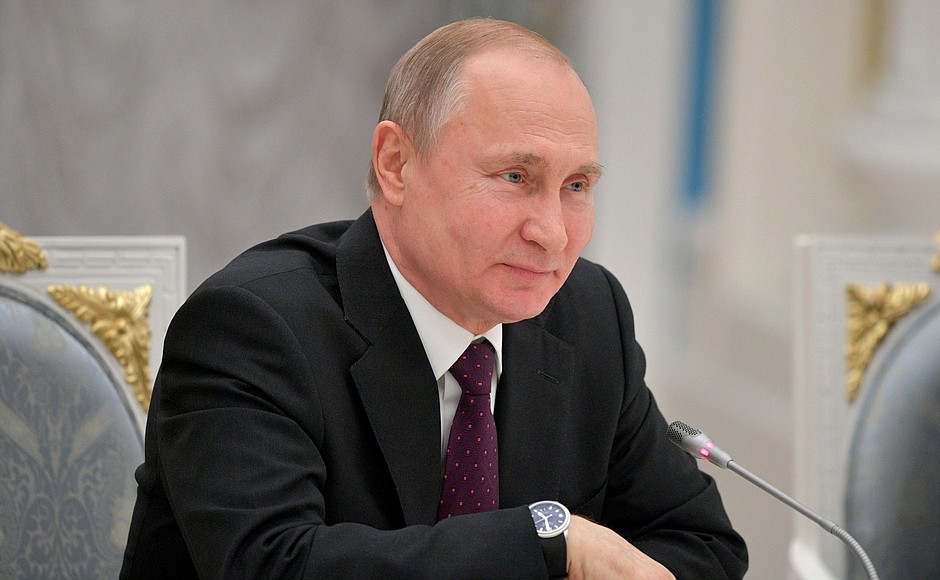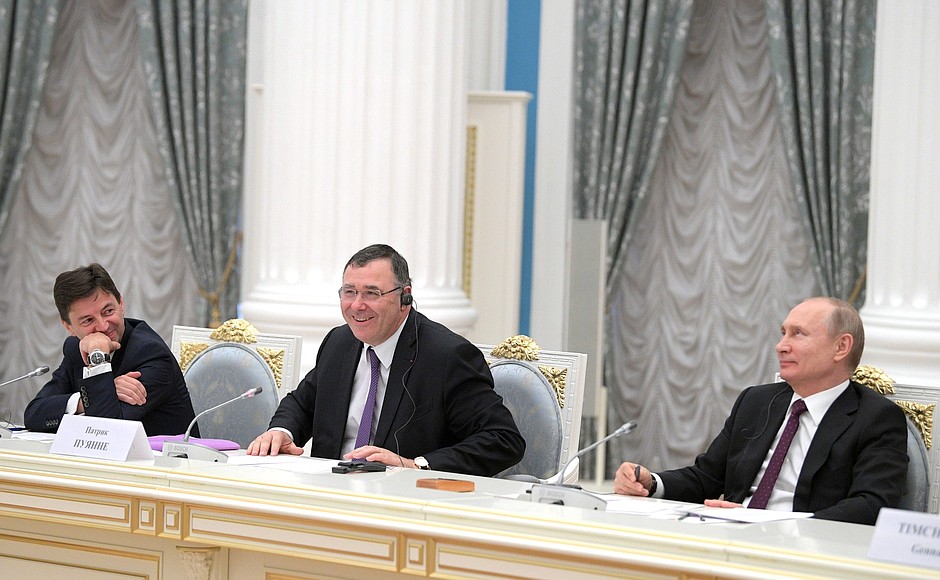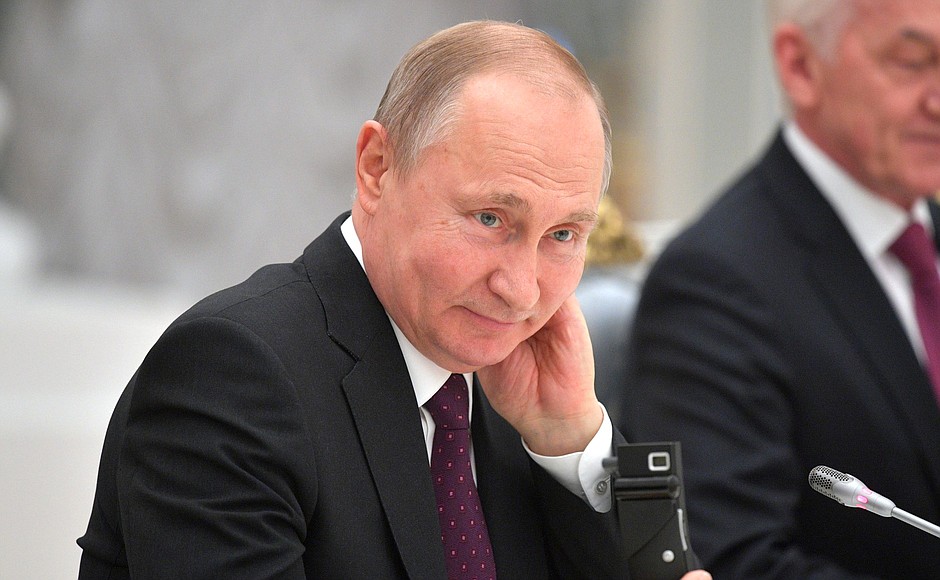President of Russia Vladimir Putin: Good afternoon, friends. I am happy to see and welcome all of you.
We met almost a year ago, in January 2018. Such meetings are always useful, because they give us a chance to discuss our joint work and what is needed to improve its organisation and achieve more ambitious goals. But I believe that overall we should be content with how our relations are developing, I mean the difficult external conditions primarily.
Before we get down to work, I would like to offer my condolences on the tragedy that happened in France, the fire at Notre-Dame. Of course, it is not only a cathedral, not only a symbol of France, but a symbol of European civilisation and European culture.
We all are saddened by it; we all looked on in tears. I know that the French business community is ready to help with the restoration. I also know that Russian companies working together with you, working either in France or with French partners, are also ready to step in. I am sure that the restoration plans announced by the President of France, Emmanuel Macron, will be implemented.
Speaking about our bilateral relations, they are developing well: last year bilateral trade grew by 11 percent to reach $17 billion. French investment in the Russian economy exceeds $18 billion.
Let me remind you that over 600 French companies or companies with French capital or French participation operate on the Russian market. Bilateral cooperation in energy is of strategic importance. We are all well aware of this.
Russian and French oil and gas companies participate in such joint projects as Nord Stream, Yamal LNG; together they are building Nord Stream 2 and Arctic LNG 2.
I have repeatedly said that in Russia we are doing everything we can, and will continue to do to make sure foreign investors, including you, colleagues, feel as comfortable as possible in this country.
Active efforts are made to improve macroeconomic stability. In general, we are pleased with how we are doing in this area.
Last year, Russia’s GDP added 2.3 percent. This is somewhat higher than our own plans, our forecasts. Industrial production grew by almost three percent.
In 2018, the Russian federal budget had a surplus of 2.6 percent of GDP. We are constantly looking to remove administrative barriers and optimise tax rates.
Thanks to this, Russia this year jumped four spots in the World Bank’s Doing Business ranking to 31st place.
Gentlemen, we even overtook France by one spot. I hope you find working in Russia no worse than working in France.
Foreign businesses are offered special investment contracts, which guarantee that tax and administrative terms will not change for the worse.
At the same time, companies that deliver products manufactured in Russia to third countries enjoy benefits under the state programme for the development of international cooperation and exports.
Significant opportunities for foreign investors are opening up in connection with the implementation of strategic national projects in Russia. We are talking about – I want to emphasise this, I want you to know. Surely, you do know, but I will say it again nevertheless. We are talking about hundreds of billions of dollars in investment in areas that are important for the growth of our economy.
Foreign companies that have chosen to localise their production in Russia can now participate in public procurement tenders on equal terms with Russian companies.
Russia pays particular attention to digital technology, as does, actually, the rest of the world. In this regard, I would like to note the activities of the Franco-Russian Chamber of Commerce and Industry, which sponsored the Trianon Startups international competition held in Paris the other day, where almost 30 Russian high-tech companies presented their innovative products.
We greatly appreciate the fact that French businesses not only do business in our country, but also participate in socially significant projects, including the cooperation of Total with Valery Gergiev’s charitable foundation and Renault’s assistance to orphanages and disabled children, as well as numerous environmental projects.
Colleagues, each of your companies contributes to people-to-people programmes in Russia. I would like to draw your attention to an initiative that would benefit from the support of business circles in France. I am referring to a purely cultural matter that has nothing to do with business but rather relates to sport.
Mr Timchenko, who heads this council on our side, is very knowledgeable about this topic. I mean the possible participation of a French hockey club in the Continental Hockey League games.
This project will not only promote our sports ties, but will also expand our people-to-people contacts in general. I hope, my friends, that you will help advance this useful initiative, especially so since it has President Macron’s approval.
Incidentally, as you may recall, last year Mr Macron was a distinguished guest of the St Petersburg International Economic Forum, leading a fairly representative delegation of senior executives from leading French industrial and financial companies.
Friends,
We will be pleased to see you and other French entrepreneurs in St Petersburg on June 6–8.
Of course, issues related to your work on the Russian market and your further plans will certainly be raised during the meeting today. My colleagues and I are ready to take part in this discussion and will be happy to answer all your questions.
Now I am pleased to give the floor to the co-chairs of the Economic Council of the Franco-Russian Chamber of Commerce and Industry, Mr Timchenko and MrPouyanné.
Go ahead, please.
Gennady Timchenko: Mr President, colleagues,
First, I would like to thank you for this opportunity to meet for a third time at our Economic Council of the Franco-Russian Chamber of Commerce and Industry. I would like to say that despite the troubled times in Russia and Europe and the fact that relations between Russian and Europe are not so great, 16 out of 20 companies in our Economic Council are present in this hall.
Taken together, these companies have already invested some $20 billion in the Russian economy. Some of them have already localised production in a way that allows them to export products made in Russia, for instance Renault, among others. So we can say with confidence that today economic and business relations between Russian and France are highly stable and promising.
MrPouyanné, my co-chair, is here today. He was not here last year, so I would like to give the floor to him. He probably has interesting questions.
Vladimir Putin: MrPouyanné, please.
Patrick Pouyanné: Thank you very much, Mr President, thank you, my friend, Gennady.
I would like to thank you for organising this meeting on behalf of all the companies and entrepreneurs. This shows that you value such meetings. Today, 15 of my colleagues have accompanied me. I think this is a sign of growing success.
It speaks to the fact that French companies remain interested in investing in Russia despite the complicated context. I often say that it is these companies that build “small bridges” between Russia and France through their work.
France is the second largest source of direct foreign investment in Russia. We are a major provider of jobs in Russia. The companies represented here have created over a hundred thousand jobs in Russia.
Thank you very much for your words about what happened in Paris. Indeed, Notre-Dame is our common symbol. I heard Russia has already offered its expertise and help in restoring the cathedral. Thank you for this.
The topic of this meeting is perhaps more pragmatic. We will likely raise some problems and ask some questions, and you will try to answer them. We will try to give the floor to each of my colleagues.
I can say that we have made good progress since our last meeting. For example, my colleagues from Air Liquide will speak about this. Several laws were amended. For example, new legislative acts and regulations were adopted in the sphere of diabetes medications. Another example concerns exports to neighbouring countries, the thing that preoccupied Auchan.
I would like to thank all my colleagues once again for coming to this third meeting. There are 15 of us and we will try to be brief and to the point. We would like everyone to have a chance to speak. Let us see together how we can create more comfortable conditions for investing in Russia.
Regarding energy, you have already mentioned Total. Thank you for your interest. I think we will continue to invest in Russia: the current volume of investment is $13 billion, and we will continue.
What did I want to say? Of course, energy is an important industry. It allows us to build these bridges between Russia and Europe, and not only between them. As of today, Russian gas is supplied to China and the US; to all points on the globe, in fact. This is a way to make you natural resources more prominent.
We will develop the local component of our projects. I would like to mention that we are currently working on a small project on Yamal: we will produce localised liquefied natural gas using Russian technology. There will be a terminal in Murmansk and a terminal in Kamchatka; these two terminals will provide for about 10 percent, so we will invest in Murmansk and Kamchatka both.
I can also affirm that the Zvezda shipyard in the Far East will work with tankers. And I know that this is what you wanted; as president of Total, I can confirm that this order was handed over to Zvezda.
We want production to be as localised as possible. In addition, you have mentioned the special tax and legal arrangements. I can say that this system is already working well for us, and we value the support of the state.
Total sponsors a Russian ice hockey team. Perhaps now we should change it up and sponsor a French hockey team instead? We will discuss this with Gennady.
Mr President, I have failed to convince you to finance a French football club, but maybe I will finance a French hockey club. Well, Total will deal with this.
I think I will finish here and, if you allow, I will give the floor to each of my colleagues. I will ask everyone to be brief and mostly ask practical questions of the President and the Government members present here today.
<…>
